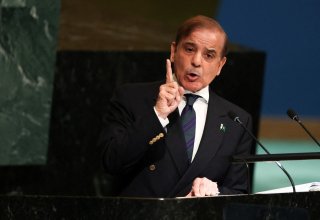Pakistan Fumes Over Biden’s ‘Most Dangerous Nation’ Remark
Hours after a transcript of the president’s remarks was posted on the White House website, the Pakistani Foreign Ministry summoned Donald Blome, the U.S. ambassador, to file a formal complaint.
The Pakistani government issued a formal objection to President Joe Biden’s recent comments criticizing the security of Pakistan’s arsenal of nuclear weapons, claiming that Islamabad handled its weapons safely and had numerous security procedures in place to prevent their theft or misuse.
Pakistan’s objections come in response to Biden’s impromptu comments during a Democratic Party fundraiser in Los Angeles on Thursday. The president referenced Pakistan in relation to the problems faced by China, historically Pakistan’s most important ally and a major foreign backer.
“[President Xi Jinping] is a guy who understands what he wants, but has an enormous, enormous array of problems,” Biden said at the fundraiser. “How do we handle that relative to what’s going on in Russia? And what I think is maybe one of the most dangerous nations in the world, Pakistan, [which has] nuclear weapons without any cohesion.”
Hours after a transcript of the president’s remarks was posted on the White House website, the Pakistani Foreign Ministry summoned Donald Blome, the U.S. ambassador, to file a formal complaint. In a statement, the ministry claimed that its military held “impeccable stewardship” of its arsenal and expressed “disappointment and concern” at Biden’s words, which it said were “not based on ground reality or facts.”
The Foreign Ministry statement suggested that other regional powers had exercised lesser control over their weapons than Pakistan had. It referenced India, Pakistan’s primary regional adversary, which recently fired three army officers for accidentally launching a missile into Pakistan in March. “The real threat to international peace and security [is] posed by violations of global norms by some states, repeated nuclear security incidents without any accountability, and [an] arms race between leading nuclear weapon states and introduction of new security constructs that disturb regional balance,” it continued.
Pakistani prime minister Shehbaz Sharif swiftly reiterated the Foreign Ministry’s position, claiming in a tweet that Islamabad “ha[d] the best safeguards [for nuclear weapons] as per IAEA requirements.”
“We take these safety measures with the utmost seriousness,” Sharif wrote. “Let no one have any doubts.”
Sharif’s predecessor in office, controversial former prime minister Imran Khan, seconded the message, writing that Pakistan’s nuclear command and control system was “one of the safest systems in the world.”
Pakistan is thought to have roughly 165 nuclear warheads, or roughly the same number as India, according to the Stockholm International Peace Research Institute (SIPRI). Its nuclear development began in earnest in 1972 and was prioritized after India’s detonation of a nuclear weapon in 1974, prompting then-Prime Minister Zulfikar Ali Bhutto to pledge that the country would “eat grass” if needed to finance nuclear development. The country conducted its first nuclear test in 1998.
Trevor Filseth is a current and foreign affairs writer for the National Interest.
Image: Reuters.

